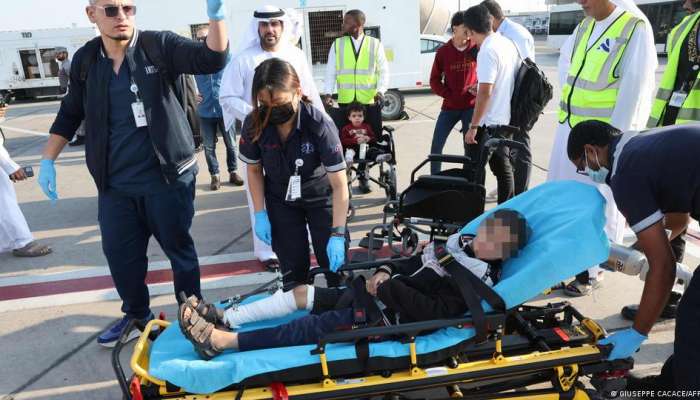
Gaza: A plane carrying the first group of Palestinian children wounded in the Israel-Hamas conflict has arrived in the United Arab Emirates (UAE), which has pledged to help a thousand young people.
The group of 15, including their family members, made it across the Gaza Strip's Rafah border crossing with Egypt, before taking a flight to Abu Dhabi.
Some of the seats of the plane were removed to make room for the most critically wounded children, who needed to lie on stretchers.
Gaza's hospitals, poorly equipped even before the latest fighting, have been running out of basic supplies and are unable to cope. Since the October 7 attacks by Hamas, which killed around 1,200 Israelis and foreigners, Israel has blockaded Gaza, allowing only minimal supplies, including medical aid, in.
The UAE has sent dozens of planes carrying food and relief supplies as part of a $20 million aid package, a foreign ministry statement said.
Aid agency staff, families trapped in Gaza
Doctors without Borders (MSF) staff and their families are trapped in the vicinity of Gaza's al-Shifa Hospital, the medical aid organization said in Berlin.
MSF said that 137 people linked to it, including 65 children, were unable to leave and that attempts to evacuate them had failed.
The organisation called for an immediate cease-fire to allow civilians to evacuate, warning that a lack of food and drinking water could lead to deaths "in the days, or even hours ahead."
It said that its staff and their families had been unable to leave accommodation near the hospital for the past week.
"On Tuesday, the Doctors without Borders guesthouse came under fire, luckily with no one injured," it said.
The office was hit by shrapnel on Thursday, and the water tank had also come under fire.
al-Shifa patients, staff and displaced leave
Hundreds of patients, staff and displaced people left Gaza's al-Shifa hospital on Saturday, leaving only a skeleton crew to care for those too sick to move.
Columns of sick and injured — some of them amputees — displaced people, doctors and nurses, made their way toward the seafront, AFP news agency reported.
On Saturday, the Israeli military said it had been asked by the hospital's director to help those who would like to leave do so by a secure route.
The military, however, said it did not order any evacuation, and that medical personnel are being allowed to remain in the hospital to support patients who cannot be moved.
But Medhat Abbas, a spokesman for the Health Ministry in Hamas-controlled Gaza, said the military had ordered the facility cleared, giving the hospital an hour to get people out.
Later, Dr. Ahmed Mokhallalati, an al-Shifa physician, said on social media that there were some 120 patients remaining who were unable to leave.
He said they included some in intensive care and premature babies, and that he and five other doctors were staying behind to care for them.
Israel's military took over the hospital earlier in the week, where it alleges a Hamas command center was located under the building, which Hamas and hospital staff deny.
The United Nations estimated 2,300 patients, staff and displaced Palestinians were sheltering at al-Shifa before Israeli troops moved in.
UN warns of threat of 'starvation' in Gaza
Fears of starvation are growing as the humanitarian situation in Gaza deteriorates, according to Martin Frick, the director of the United Nations (UN) World Food Program.
"The humanitarian situation in Gaza is disastrous," he told DW. "Everything that can be consumed without being cooked has run out. Bottled water is not available. The water sources that do exist are often contaminated and present a health risk. With the onset of winter, we are really afraid of starvation in Gaza."
Following talks with the United States on Friday, Israel's War Cabinet has approved the entry of two fuel trucks per day to Gaza from Egypt, which Frick says is "a drop in the ocean."
"Fuel is desperately needed," he appealed. "Fuel is behind everything. It's behind the desalination of sea water, which is essential for the water supply. It's essential for pumping sewage, which is vital for hygiene and public health. But it's also vital for bakeries and the production of bread, the most basic of all staple foods."
Frick said that there are supplies of around 9,000 tons of wheat in Gaza which can't be processed due to a lack of water and energy. Of the 23 bakeries the UN World Food Programme used to work with in Gaza, he said none are operational.